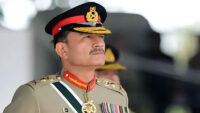ISLAMABAD: Finance Minister Shaukat Tarin has expressed hope that Pakistan will be removed from the gray list, at the next FATF review meeting.
Informing the Senate about the current situation of Pakistan in the FATF gray list, Finance Minister Shaukat Tarin said that 27 out of 28 conditions have been met. Countries that have taken a stand against us are not our friends, but there is no button for it, to be turned on or off immediately. Senate of Pakistan member, Pir Sabir Shah, said that this is a good button that has not been turned on for three and a half years.
PML-N Senator Irfan Siddiqui has said that so far, government ministers and spokespersons have been laying the rubble of their poor performance on the Nawaz Sharif government. Today the [PTI] government itself has admitted that during the PML-N era, Pakistan’s name was shifted from FATF’s gray list to the white list where it remained till the end of the PML-N government’s tenure.
French lawyer slams EU over post featuring a Muslim woman
Remittances touch to record $18b in seven months
What is FATF and how does it work?
The decision to set up the Financial Action Task Force (FATF) was made 30 years ago by the G-7 countries at a meeting in France in 1989. Later, the number of members of the G7 Alliance increased from 16 to 39, including 37 countries and two regional cooperation organizations. In addition, 8 regional organizations are affiliated with the FATF. Pakistan is part of the FATF-affiliated Asia Pacific Group. The FATF extends directly and indirectly to nearly 180 countries.
The FATF is a task force formed jointly by governments. The purpose of which is to take joint action against money laundering. In the aftermath of the 9/11 attacks in the United States and the war on terror that began, it was felt that joint efforts were needed to prevent the financing of terrorism. Subsequently, in October 2001, money laundering, as well as terrorist financing, were included in the FATF’s objectives. In April 2012, the task force was tasked with overseeing large-scale arms financing and implementing countermeasures.
The task force operates on its open agenda on a purely technical basis, so the task force consists of experts from different countries on counter-money laundering and terror financing. The current president of the task force is Dr. Marcus Pleyer of Germany, preceded byXiangmin Liu, from China who prior to becoming President of the FATF, headed the Department of Money Laundering and Prevention of Terrorist Financing at the Central Bank of China. Xiangmin has taken a number of steps to curb illicit capital flows into China. According to acams.org (Association of Certified Anti-Money Laundering Specialists), prior to his position as President of the FATF, Dr. Pleyer served headed the Division for International Financial Markets between 2014 and 2015, respectively.
Qatar Airways to Resume Scheduled Services to Multan
LCCI decries power tariff hike plan
The FATF is tasked with enforcing and monitoring the implementation of uniform laws around the world regarding money laundering and terrorist financing. It seeks to ensure that the uniform definition of financial laws in each of its member countries is implemented and enforced uniformly. So that the movement of the wealth gained from looting [black money] in the world would be made the most difficult and it would become impossible for people to have such wealth. Gray-listed countries may face various global economic sanctions, while the disbursement of loans by international institutions may be stopped on the same basis.
The FATF worked swiftly in the first two years of its existence and drafted the first proposals by 1990. Later, in 1996, 2001, 2003, and 2012, it also submitted its other proposals.
How did Pakistan get on the gray list?
To curb money laundering and terrorist financing, the FATF’s 40 recommendations are being implemented by a subsidiary organization called the International Corporation Review Group. In November 2017, the International Corporation Review Group met in Argentina, which passed a resolution on Pakistan. It drew attention to the alleged support given by Pakistan to organizations like Lashkar-e-Taiba, Jaish-e-Muhammad, and Jamaat-ud-Dawa.
Subsequently, the United States and the United Kingdom recommended that Pakistan be included in the gray list, which was later supported by France and Germany. Pakistan’s then finance minister, Muftah Ismail, called on the United States and three other countries to withdraw Pakistan’s name, but all diplomatic efforts were in vain, and in June 2018, Pakistan was added to the FATF’s gray list. Even before this, Pakistan has been a part of the gray list from 2013 to 2016.
COAS Bajwa visits Nagarparkar to interact with troops
US to equally distribute frozen Afghan assets among 9/11 victims
Pakistan Updates: Over 3,000 Covid-19 cases reported
Banning the hijab violates religious freedom: United States
Hijab Row: Uttar Pradesh also expels students from class
Stay tuned to Baaghi TV for more. Download our app for the latest news, updates & interesting content!






